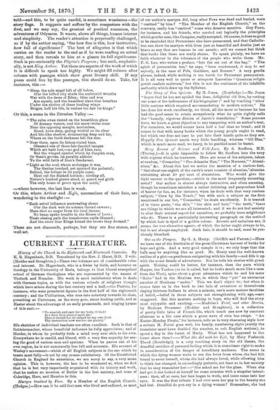The Story of Don Quixote. By M. Jones. (Routledge.)—Mr. Jones
"hopes that he has not spoiled the dear, delightful old Don, by cutting out some of the tediousness of his biographer ;" and by touching "other
little matters which required accommodating to modern notions." He has done his work excellently, we think, all the more so because he has
had the good sense to retain scrupulously what he quite rightly calls the "homely, vigorous diction of Jarvis's translation." Some persons have, we know, a great objection to any tampering with an author's text. For ourselves, we would sooner have half a loaf than no bread ; and it comes to that with many books which the young people ought to read, but which one does not care to put into their hands quite as they are. Happily Don Quixote needs very little handling, whereas "Gil Blau," which is much more read, we fancy, to bo purified must be burnt.
Stray Leaves of Science and Folk-Lore. By S. Sooffern, M.B. (Tinsley.)—It is quite impossible to follow Mr. Scoffern into the very
wide regions which he traverses. Hero are some of his subjects, taken at random, "Cosmetics," " Pre-Adamite Man," "The Maroons,"" Alumi- nium," &c. About this last we notice the mention of a curious foot, that about one-eighth of the earth's crust consists of alumina,"alamina containing about 50 per cent of aluminium. Who would give the right answer to the quostion,—which is the most frequently occurring metal? Our author is almost always instructive, and often amusing, though he sometimes mistakes a rather irritating and purposeless kind of banter for fun, as, for instance, when he deals with that very carious subject, " Cure by the Touch ;" but with such a subject as the first mentioned in our list, "Cosmetics," he deals excellently. It is treated of in three parts, "the skin," the skin and hair," "the teeth," these are things in which we urn all interested; and if we do not feel anxiety to alter their natural aspect for ourselves, we probably have neighbours who do. There is a particularly interesting paragraph on the method by which hair is dyed of a golden colour. Arsenic and cadmium are, it seems, the two alterative agents, of which the latter ought always to be, but is not always employed. Dark hair, it should be said, must be pre- viously bleached.


































 Previous page
Previous page